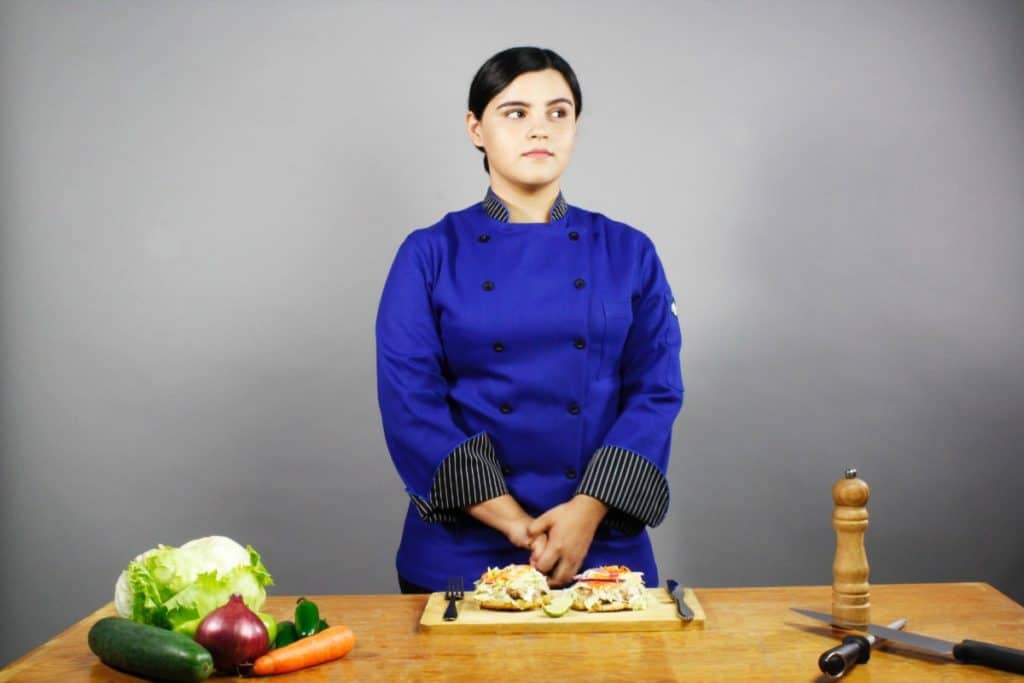
My experience as a chef over a 10 year period, had huge positives but also many negatives. In this article I will focus on the bad things about being a chef. By putting together this list of the 12 negatives of being a chef based on my own career, I hope to give and honest and fair view of the catering industry.
In my experience, there are many negatives to being a chef and the career path is not suited to everyone. Some examples of the bad points about being a chef which I experienced are;
- long working hours
- poor pay
- high intensity work
- high discipline levels
- unsociable hours
- physically demanding work
- High burn out rate (to name just a few)
These are just a selection of the 12 disadvantages to being a chef, which I will cover in this article. We will look at these and the other bad points in detail throughout this post.
If you’re looking for a more positive view then it’s definitely worth checking out our article; Is Being a Chef a Good Career which is linked here.
So for now, we’re going to put our passion for the industry aside and look at the main bad points about life as a chef. I will also add some balance by pointing out the other side to each point where I can.
1. Chefs Have Long Working Hours
I’ve wrote several articles now discussing chef working hours in detail (which we’ll link here ) so for the purposes of this article I’ll provide just a quick summary here.
) so for the purposes of this article I’ll provide just a quick summary here.
Chefs typically work 50-60 hours over a five day working week, and many more if they have to work more than 5 days in a row. This is a lot of hours by any job’s standards and in my opinion the main negative of becoming a chef.
- Some chefs may argue that they love cooking
 and enjoy their jobs so much that they don’t mind putting in all the hours. I guess it comes down to personal choice and preference.
and enjoy their jobs so much that they don’t mind putting in all the hours. I guess it comes down to personal choice and preference.
2. Chefs Generally Have Poor Pay
When we look at chefs as being poorly paid it’s usually based on the fact that they have to do a lot of hours
it’s usually based on the fact that they have to do a lot of hours for the money they earn. Therefore in terms of hourly pay, the pay for chefs is quite poor.
for the money they earn. Therefore in terms of hourly pay, the pay for chefs is quite poor.
When starting out on your chef career, if you stop and calculate your hourly rate it will usually fall below minimum wage. However, as a chef progresses up through the ranks their pay increases and can actually become quite substantial if they become a Head Chef or Executive Chef of a good establishment.
- To balance this point, some may argue that as being a chef is a career that doesn’t require any academic qualifications, the pay is not bad when compared to other careers with this low barrier to entry
 .
.
3. Chefs Work At A High Intensity
Anyone who’s spent anytime working in a kitchen, or even watching T.V shows such as Hell’s Kitchen, will know that a kitchen is a very intense work place to be in. Every day there are deadlines that have to be met and performance standards that have to be reached.
In other careers it may be possible to ‘have an off day.’ This is not true of catering and if a chef’s performance is below par on a given day, the Head chef is sure to let them know without any hesitation.
is sure to let them know without any hesitation.
It’s this high intensity that is responsible for the high burnout rate we shall look at later.
- The positive side to this intensity is that it allows chefs to focus solely on work whilst they are there. If a chef has problems at home, (as we all get from time to time), they are able to forget about them whilst they’re at work as they are simply not able to focus on both things at once!

4. Kitchens Have High Discipline Levels
There are few careers where the discipline is as high as that in a kitchen. There is a very clear rank structure and everyone in the kitchen follows this at all times.
The bad thing about being a chef and when the problems can come is when a chef disagrees with the Head chef’s ways of running things. Perhaps the chef has been there a while and the new Head chef has come in and started to change things around.
with the Head chef’s ways of running things. Perhaps the chef has been there a while and the new Head chef has come in and started to change things around.
Unfortunately for the lower ranked chef , in the world of catering, the Head chefs word is final.
, in the world of catering, the Head chefs word is final.
This leaves the lower ranked chef the choice of towing the line, or moving onto find a restaurant more suitable to them.
Another element to the discipline is the shouting. Although in reality this is rare, it does happen and can be difficult for some chefs to cope with.
- However, some chefs thrive in this structured environment. This high discipline, direct dealing with any issues helps prevent a lot of the ‘behind the back’ problems you get in other work places. If a chef displeases the boss they are made aware of it in no uncertain terms. Everyone then moves on with no grudges held.
5. Chef Don’t Get Breaks
Many people outside the industry struggle to believe this is true, but unfortunately in the majority of restaurants it is. Chefs often work all day without taking breaks. They tend to eat whilst at their work stations (although this is technically not allowed by Food Hygiene Standards ) as they have so work they need to get done and fixed deadlines to meet.
) as they have so work they need to get done and fixed deadlines to meet.
- As a non smoker, I have to point out here that the amount of cigarette breaks
 some chefs take in a day constitutes to a lunch break anyway! If you are a non smoker reading this then fear not, as I used to go outside with the chefs for a ‘fresh air break’ so that I could get some outside time as well!
some chefs take in a day constitutes to a lunch break anyway! If you are a non smoker reading this then fear not, as I used to go outside with the chefs for a ‘fresh air break’ so that I could get some outside time as well!

6. A Chef Job Is Physically Demanding
The culmination of long hours, small breaks, and the fact that a chef is on their feet all day, make being a chef a very physically demanding job. It may not be physically demanding in the sense of lifting heavy things but your feet are definitely sore at the end of a long shift!
This physical demand is large a negative to being a chef. It may be easier to cope with as you are younger and fitter, but i know from personal experience that as you get older it gets harder to maintain the high kitchen pace that is required all day.
is large a negative to being a chef. It may be easier to cope with as you are younger and fitter, but i know from personal experience that as you get older it gets harder to maintain the high kitchen pace that is required all day.
- However, some chefs enjoy the physically demanding nature of the job. A catering career tends to attract people that do not want to work in an office or sit in front of a computer all day. For some the physical demands are taken in their stride and they love the ‘buzz’ they get from a difficult service.
7. Chefs Have To Work Unsociable Hours
Bad point about being a chef number 7 ,is that as well as demanding long working hours , a career as a chef also ensures you are almost guaranteed to be working whilst everyone else is off work enjoying themselves!
, a career as a chef also ensures you are almost guaranteed to be working whilst everyone else is off work enjoying themselves!
Most kitchens operate 7 days a week, and the busiest days for a chef are usually Friday, Saturday and Sunday. This means that the chances of a chef having the weekend off to enjoy with their family are pretty slim.
Bank holidays and special days are also part of a chefs normal working routine. Be it Christmas, Easter, Mothering Sunday or any of the other public holidays, a chef is more than likely to be in work and usually very busy, as they deal with all the additional customers that have the day off.
- This is more of a struggle to find the balanced view on this one! I guess the only help I can give is that shifts on days such as Christmas have been some of my favourite work memories. All the chefs are in a jovial mood and the atmosphere is actually really good fun.
Another bad career aspect worth noting is that most chefs will not be paid extra to work on public holidays. They receive a day off in lieu as required by law, but in terms of pay, it is considered part of their standard salary arrangement!
8. There Is A High Burn Out Rate Among Chefs
The physical demands of the job take there toll on a lot of chefs. The term ‘Burn Out’ is widely used in the industry to describe a chef that has decided to end their chef career and pursue other avenues.
is widely used in the industry to describe a chef that has decided to end their chef career and pursue other avenues.
If you’re unsure if this is true, look around a professional kitchen. You will notice a vast majority are younger in age . As a chef gets older they can’t, or simply don’t want to, do the hours that are necessary to maintain their career.
. As a chef gets older they can’t, or simply don’t want to, do the hours that are necessary to maintain their career.
Many chefs choose to take a lower paid job, in a restaurant with a lower standard of cuisine
, in exchange for more favourable working hours and a better work life balance.
- When a chef decides to change caree
 r, there are other avenues open to them that allows them to use the skills and knowledge they have gained. Many go on to teach at culinary schools, or become executive chefs
r, there are other avenues open to them that allows them to use the skills and knowledge they have gained. Many go on to teach at culinary schools, or become executive chefs which focus on menus and the business side rather than the day to day running of the kitchen.
which focus on menus and the business side rather than the day to day running of the kitchen.
9. Chefs Don’t Get Traditional Job benefits.
In my experience, if you are looking for a career with traditional job benefits such as bonus structure, sick pay, or company car, then unfortunately a career as a chef may not be the best path to choose.
Chefs tend to move jobs fairly regularly in order to further their careers  and as such don’t tend to build up the traditional job benefits from a long service time with a company.
and as such don’t tend to build up the traditional job benefits from a long service time with a company.
One could argue that successful restaurants should reward the hard work of their chefs more fairly by paying a bonus structure on the profits they make in a year.
- On the other side, many people would argue that the tips chefs receiv
 e (if they receive tips) more than make up for the lack of traditional benefits. Add to that, the fact that chefs often have staff meals for free and quite often have heavily subsidised accommodation
e (if they receive tips) more than make up for the lack of traditional benefits. Add to that, the fact that chefs often have staff meals for free and quite often have heavily subsidised accommodation , and this is better than the other benefits offered by many other careers.
, and this is better than the other benefits offered by many other careers.

10. Chefs Have Non Transferable Qualifications
Many career paths have qualifications which are transferable. For example, if a person studies engineering then they usually find there are many different paths open to them. If they dislike one type of engineering they can pivot into a different path.
Later on in my career, I discovered that unfortunately for chefs, the only career path our qualifications are recognised in is within the catering industry. This is not a problem until a we decide we would like to leave the industry.
This means chefs usually have to completely retrain in order to find work in a different industry.
- Some would argue that the skills learnt as a chef are transferable. Many employers like the fact that a chef can work really well as a team member, remain calm under pressure, and meet the deadlines required. I guess when a chef decides they would like to leave the catering industry
 , it is how they choose to frame their experience which is most important.
, it is how they choose to frame their experience which is most important.
11. Kitchens Are Highly Competitive Places To Work
Chefs have a clearly defined rank structure and career path which they can climb. Whilst this is great in some ways, a negative of being a chef is that we can find the competition for promotion is extremely fierce.
and career path which they can climb. Whilst this is great in some ways, a negative of being a chef is that we can find the competition for promotion is extremely fierce.
All chefs are looking to progress up the career ladder and the competition for jobs can leave some chefs feeling like they are at the back of the queue when it comes to their promotion chances.
and the competition for jobs can leave some chefs feeling like they are at the back of the queue when it comes to their promotion chances.
A lot of chefs find the only way they can progress, particularly in a smaller kitchen, is to leave and seek a higher position at another restaurant.
If there are not many sections going from commis chef to chef de partie and sous chef
and sous chef can be very challenging.
can be very challenging.
- On the other side, all careers have high competition for promotion. Some people look at this competition as a good thing as it encourages everyone to work to the highest standards that they can!
12. Chefs Often Find Their Love For Cooking Fades
Turning your passion into a career can be a bad idea in lots of industries, and this is also true for chefs. Many people enter the industry because they love food and have a passion for cooking. Over time, cooking for so many hours everyday, this passion and love for food starts to fade.
A negative to being a chef is that we find many chefs don’t do any cooking on their days off, as we need a break from the kitchen.
In fact most chefs I know actually eat terrible food a lot of the time because they can’t face having to cook on their one or two nights off.
I’ll never forget watching chefs at a two Michelin star restaurant microwaving burgers for their split shift lunch. It seems the higher the dedication to serving customers the finest cuisine; the less enthusiasm is left for making sure you eat well yourself.
- For some chefs being able to cook and do what they are passionate about every day for a career is the best part about their job. Some never loose that passion and can’t ever imagine ever doing anything different with their lives.
To Sum up
So that’s the complete list of the 12 disadvantages of being a chef. I’ve tried to be as fair as possible by giving both sides of the argument. I guess it’s up to individuals to decide if each category is a disadvantage or actually an advantage in their opinion!
